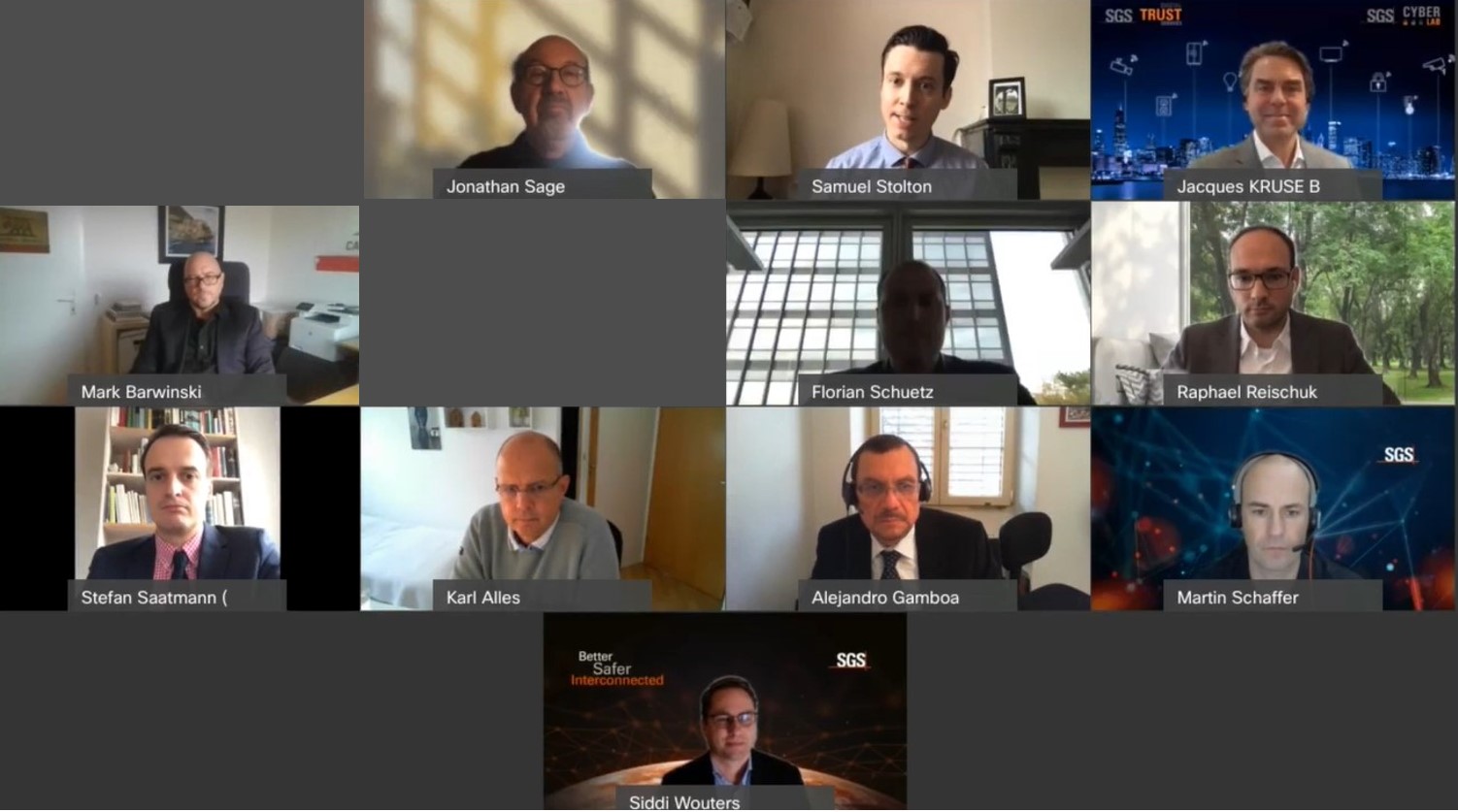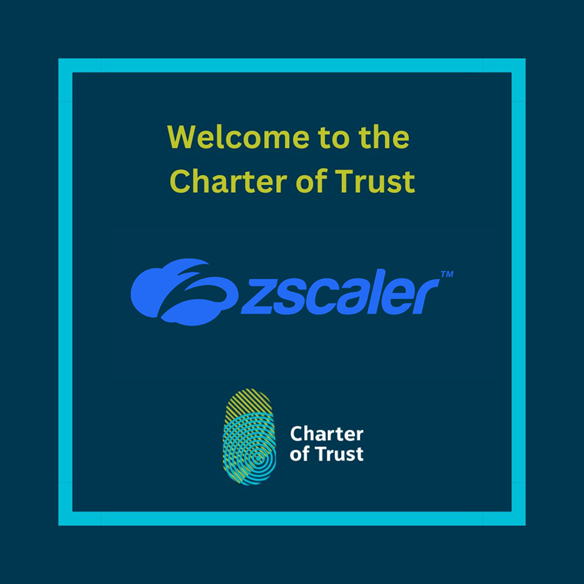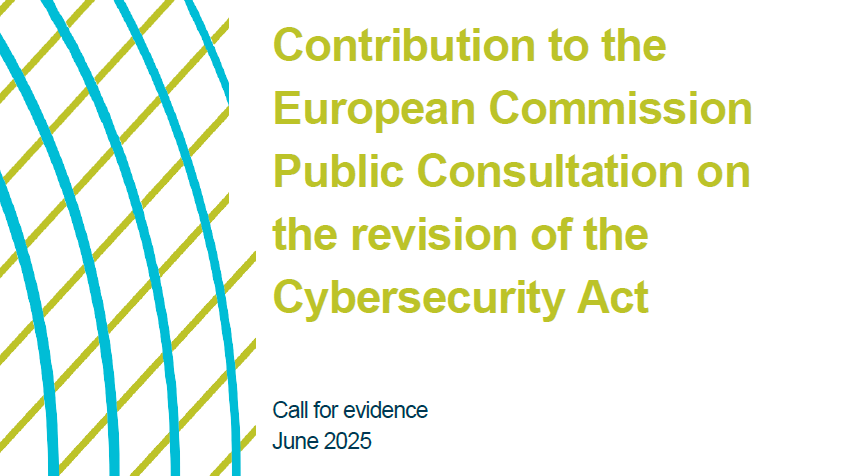On 20 October, the Charter of Trust hosted its first-ever Geneva Roadshow with experts from Switzerland, from the World Trade Organization, as well as from Charter of Trust member companies. Discussions focused on how cybersecurity measures can be strengthened with collaboration in threat information sharing to increase the resilience of the digital supply chain amid growing cybersecurity threats.
The session was introduced by Siddi Wouters, Senior Vice President for Digital & Innovation at SGS, who argued that the evolving cybersecurity landscape called for harmonized cybersecurity requirements. Within the Charter of Trust, each member contributed with its own expertise in different parts of the digital supply chain to effectively promote and ensure trust. The launch of the SGS-TU Graz IT security research, education, testing and certification hub in the coming weeks was a concrete illustration of the ongoing work to strengthen cybersecurity resilience.
Florian Schütz, Swiss Federal Cyber Security Delegate, gave a keynote speech on the Swiss Cybersecurity Strategy, and highlighted how Switzerland approached current challenges in the field. For cybersecurity, Mr. Schütz argued that “hope and fear have never been good advisors” and better sharing of threat information between stakeholders was key.
Jacques Kruse Brandao, Global Head of Advocacy, Digital Trust Services at SGS, gave an introduction to the Charter of Trust and its 10 Principles. Against the development of professional hacking and growing cyber-risks, the Charter of Trust aimed to drive security in an insecure, connected world. Mr. Kruse Brandao was joined by Jonathan Sage, Government and Regulatory Affairs Executive at IBM, Karl Alles, Group Security Officer at Atos and Dr. Stefan Saatmann, Global Coordinator for Cybersecurity Policy at Siemens. The group presented how Charter of Trust members collaborate to implement the Charter’s 10 Principles.
This was followed by a panel discussion moderated by Samuel Stolton, Digital Editor at EurActiv:
Dr. Raphael M. Reischuk, Vice-President of the Cybersecurity Commission ICT Switzerland, presented the proposal for a Swiss Conformity Assessment Institute which aimed at increasing trust with certifications as ensuring conformity should not be left to the private sector alone.
Florian Schütz, Federal Cyber Security Delegate, noted that governments must take a macro-perspective of the supply chain as there are many different types of supply chains, and to ensure the integrity of the supply chain as a whole.
Alejandro Gamboa-Alder, Secretary of the Council for Trade in Goods at the World Trade Organization, argued that technology could make trade more secure thanks to e-certificates which were key to foster trust in global supply chains. Mr. Gamboa-Alder further stressed the need to report incidents without delay and mentioned the resistance of some stakeholders with regard to increasing transparency.
Mark Barwinski, Global Head of Cybersecurity Detection & Protection at Siemens, stressed that building resilience was of utmost importance, notably in a period when working from home had become the norm. Companies should therefore increase detection capabilities and enforce cyber hygiene measures. Moreover, the development of threat information sharing networks in Information Sharing and Analysis Centres (ISACs) and within the Charter of Trust helped build trust relationships that created value for each company.
Dr. Martin Schaffer, Global Head of Cybersecurity Services at SGS, noted that the proposal for a Swiss Conformity Assessment Institute was a relevant approach and constituted a complementary step to the Charter of Trust’s Principle 2 baseline requirements.
Jonathan Sage, Government and Regulatory Affairs Executive at IBM, stressed the importance to raise resilience with a risk-based approach to secure the supply chain.
Jacques Kruse Brandao concluded the discussion by inviting attendees to join the Charter of Trust Madrid Roadshow, which will take place on 3rd December, focusing on Spain’s cybersecurity strategy.



You may also like

Charter of Trust Welcomes Zscaler
Zscaler is a leading cloud enterprise security provider helping global businesses accelerate their digital transformation by becoming more agile, efficient, resilient, and secure.
With Zscaler as a partner in the Charter of Trust, we aim to strengthen global cyber resilience through trust – by fostering actionable collaboration between industry leaders, governments, and public-private platforms. Zscaler brings robust expertise and innovation to the table, making it the ideal partner to drive this mission forward.
“Zscaler is excited to drive meaningful change alongside our new partners, laying a foundation of trust essential for successful digital transformation,” said Sam Curry, Zscaler CISO. “In today’s world, the need for reducing inherent trust and default access has never been greater. To truly stay ahead of ever-evolving threats, we must unite as a coalition of practitioners. Cyber attackers aren’t taking breaks, and with advancements like artificial intelligence, quantum cryptography, and emerging technologies on the horizon, collaboration is the key to securing the future.”
“We are proud to welcome Zscaler to the Charter of Trust. Their focus on cybersecurity innovation and commitment to openness reflect our shared ambition to create a safer, more resilient digital future. Together, we’ll strengthen trust, transparency, and security across the global digital landscape.” highlighted Dr. Summit Chada, Charter of Trust Co-Chair and COO Group Security & Business Lines CISO at Atos.
“With Zscaler as a Partner of the Charter of Trust, we believe that we can strengthen the global commitment to secure digital transformation by combining technological innovation with the Charter of Trust’s collaborative approach to cybersecurity leadership.” Ralf Schneider, Charter of Trust Co-Chair and Senior Fellow and Head of Cybersecurity and NextGenIT Think Tank at Allianz SE, welcomes Zscaler to the Charter of Trust.
We are excited to join forces and work together to advance digital trust and security across industries.

Contribution to the EU Commission Public Consultation on the revision of the Cybersecurity Act
We support Policy Option 2, which focuses on targeted regulatory measures that address key challenges without creating unnecessary complexity. In this context, we emphasize the need to enhance the role and resources of ENISA, to ensure effective implementation of both current legislation and the European Cybersecurity Certification Framework (ECCF).
Our recommendations aim to improve transparency, collaboration, and efficiency across the EU’s cybersecurity landscape. These include:
- Introducing clear timelines for the development of certification schemes.
- Enhancing stakeholder engagement throughout the process.
- Establishing more structured communication channels between ENISA, the Stakeholder Cybersecurity Certification Group (SCCG), and sectoral ISACs (Information Sharing and Analysis Centers).
We call for a stronger ECCF, one that is transparent, inclusive, and aligned with international standards to foster global interoperability and ease compliance for organizations across borders. Equally critical is the harmonization of certification practices across EU member states and the mutual recognition of certifications to minimize regulatory fragmentation.
The Charter of Trust advocates for technically robust, standards-based certification schemes, with well-defined roles and responsibilities. We also stress the need for clarity on the interplay between voluntary and mandatory certifications, particularly in relation to the upcoming Cyber Resilience Act (CRA).
To streamline compliance and reduce administrative burden, we propose a unified, risk-based incident reporting regime that consolidates requirements under regulations such as NIS2, CRA, GDPR, and DORA. This would not only simplify reporting for organizations but also enhance the EU’s overall cyber resilience. In addition, we recommend incorporating liability protections and grace periods for incident disclosure.
Finally, we urge the Commission to strengthen supply chain security by adopting a risk-based classification approach and establishing baseline cybersecurity requirements for ICT suppliers.
The Charter of Trust remains fully committed to supporting the European Commission in shaping a secure, resilient, and trusted digital future for Europe. We look forward to continued collaboration in building a cybersecurity framework that meets the needs of all stakeholders, today and in the years to come.




